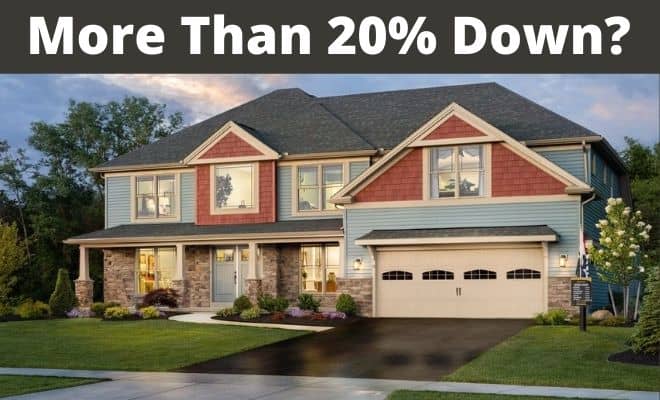Should I Put More than 20% Down on a House?

Many home buyers struggle to come up with even a small down payment while others have more than enough and ask themselves “should I put more than 20% down on a house?”.
You should put more than 20% down on a house if it fits into your long term financial plan and if it does not leave you without reserves after closing.
Benefits of Putting More than 20% Down on a House
If you have the ability to put more than 20% down on a house, you will likely enjoy some of the following benefits:
- Lower Interest Rate – The size of the down payment is a major factor in how lenders set their interest rates. The larger the down payment, the lower your interest rate will be.
- Lower Monthly Mortgage Payment – If you have a larger down payment, then your loan amount will be smaller. When you combine that with a lower interest rate, your monthly mortgage payment will be a lot lower.
- Less Interest Paid Over the Life of the Loan – The more you borrow, the more you will pay in interest payments over the life of the loan. Therefore, if you borrow less due to a larger down payment, then your interest payments will be much lower. You can save an estimated $500 per year in interest for each additional $10,000 in down payment.
- More Equity in the Home – If you put more money down, you will immediately have more equity in your home. You will also have the ability to pay down your mortgage faster starting with a lower balance.
- Competitive Advantage vs Other Buyers – In a seller’s market, buyers will often lean towards awarding the bid to buyers who come to the table with a stronger overall offer. This includes the size of the down payment and sometimes type of mortgage program. Meaning, the buyer who is offering the most cash may get their offer accepted.
- Mortgage Underwriting Compensating Factor – If your mortgage application is borderline either due to the credit scores or debt to income ratio, a larger down payment could be the compensating factor that will get your mortgage application approved.
These are just some of the basic advantages of buying a house with a down payment more than 20%. We suggest speaking with a qualified loan officer to review your situation to help you to make the best decision for yourself.
Disadvantages of Putting More than 20% Down on a House
A large down payment is not always the best course of action and there are some disadvantages to putting more than 20% down on a home.
- Missed Investment Opportunities – When interest rates and the cost of money is low, you may think about putting less money down on the purchase of your home and use those funds for investments or retirement vehicles which would earn a higher rate than the interest rate on your mortgage. For example, if your mortgage interest rate is at 5% but you can earn 10% investing the money, then you are going to come out ahead.
- Less Cash Reserves Available – When you purchase a home, you do not want to spend everything you have on the down payment and closing costs. Reserves are needed in the event of some costly repairs which could arise especially when purchasing an older home. Reserves also become extremely important when there is a job loss to one or more of the individuals in the household.
- Opportunity to Spend on Upgrades and Improvements – If you hold back some of your down payment money, you can use those funds to make upgrades or improvements which can increase the value and enjoyment of your home.
Something that many home buyers do not realize is that it is easier to put less money down on the purchase than cash out or get a home equity loan later. For example, you can get an FHA loan with just 3.5% down. However, if you want to get an FHA loan to cash out your equity, you will be capped at borrowing 80% of the home’s appraised value.
Do sellers prefer when buyers put more money down?
Sellers sometimes prefer when home buyers put more money down, but their realtors always will lean towards home buyers who prove to be strong buyers financially. This means individuals who are planning to buy the home for all cash, or have a very large down payment.
How much should first time home buyers put down on a house?
The decision about the size of the down payment would not be any different for first time home buyers. As a first time home buyer, you should ask yourself some of the same questions and evaluate your financial situation the same way anyone else who is not a first time home buyer would.
